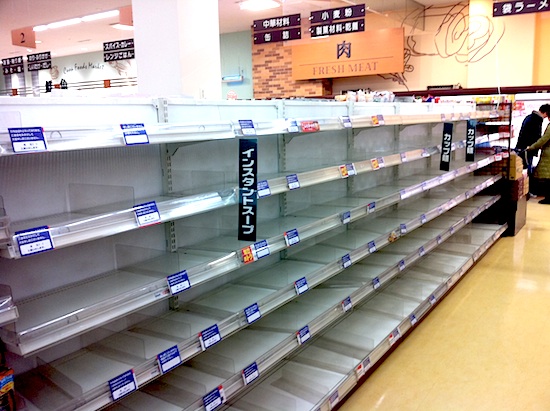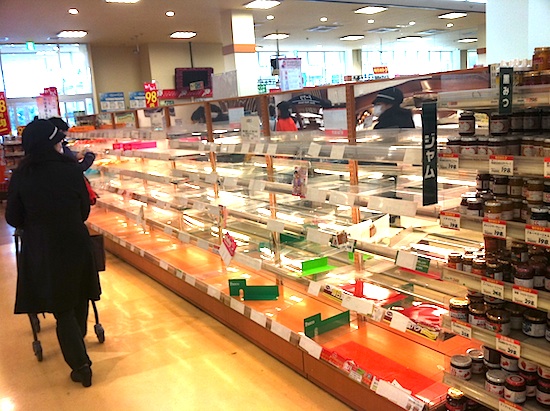More or Less Normal
As northern Japan is devastated, Tokyo is more or less normal. Train lines have come back up, and those who were trapped in the city are now largely back home. The only things that seem different are a few bare areas in markets. Although the meat and fish (much meat in Japan comes from up north; fishing, obviously, may have been affected by the tsunami) were low in supply, they were still there. What was missing: pastry and instant noodles. Instant noodles made sense at least–a quick, easy food with a long shelf life. People may have feared a quake hitting Tokyo, though frankly I don’t see that as being any more a risk than usual. But the pastry? Not sure why that should be absent…



“Screw the ダイエット”
Glad to hear that you and Sachi are fine -as well as your brother and your sister in law.
EXCELLENT REPORTING!
Predictably, flashlights and most batteries were completely sold out everywhere. Good luck trying to buy anything of an emergency-related nature.
Interestingly, although no great lines formed for a full day after the quake, late Saturday afternoon long lines started forming at gas stations all around town. Since the gas stand in this area is along a main road which is one lane each way, the line blocked traffic and backed things up for as far as I could see. Either people are getting fueled up in case they have to leave, or are doing it before the prices go sky-high.
^ generally why it’s a good idea to go camping at least once or twice so you have the gear and familiarity with living off the grid temporarily.
Plus it can be relaxing, of course.
How is the news about the Fukushima power plant issues reported in Japan ? Do people trust the news issued by TEPCO and the government side or the more pessimistic by environmental groups ?
Z: Good question. Short answer: I don’t know. I am busy enough with keeping up in English, I have not been trying to track nuance in the Japanese reports. Sachi just has any random channel on all day, and currently it’s mostly press conferences and grainy footage.
Perhaps this gets to me more than it should because I grew up in a Nuclear town, but I don’t think the worry should be about what environmental groups think about nuclear power. The #1 priority is safety, and there was an evacuation order near the plant for a reason. The government and power companies aren’t trying to present any “side”. The power companies are doing their best to do what they can with failed cooling systems to save the plants and the people. The containment vessel around the reactor is holding up for now, and we can hope that the strict safety codes for reactor construction in Japan minimize atmospheric radiation.
Agreed. A lot of people here have been overworried because news sources keep quoting people who claim this could be another Chernobyl, claiming impending doom. The thing is, every time I see such a source, it turns out to be either an anti-nuclear activist or someone associated with them. I trust them much less than I trust the people running the plant; both have reasons to, respectively, overstate or understate the danger, but the ones running the plant will be held accountable for what they say–they alarmists won’t.
Most apparently sound sources I see say this could be bad, but not Chernobyl bad. The light-water reactor doesn’t use the carbon that made Chernobyl as bad as it was, and the winds would almost certainly carry whatever radioactivity is released out to sea. The major disaster here is and always was the tsunami.
I take issue with this, and it’s not because I am sympathetic to environmentalism. I always thought the dangers of nuclear power had been way overblown. But after this earthquake, I see how easy it is to underestimate those hazards. This partial nuclear “meltdown” happened in “Japan”, and I emphasize that last word because Japanese are anal about safety requirements! And yet the emergency cooling system failed. That says to me, “if it happened in Japan, it could happen anywhere.”
It was the same with offshore drilling. We all want to be able to offset our dependence on foreign oil by producing/refining our own. Then the Gulf spill made us look like complete idiots.
It’s like no matter how safe the authorities claim sth is, nature has a way of letting us know she is still in control.
We are always just a broken safety valve away from a nuclear nightmare.
I didn’t want to get dragged into the nuclear debate since it’s a waste of time, but I think it’s possible to create a safer technology that is relatively “fail safe”.
Whether this is “pebble bed” or whatever I dunno, but one thing you should know Ken is that the Japanese don’t really have that great a record on safety or coordination.
I’d like to think that our system is hardened enough to be able to survive more than 8 hours off the grid.
I’ve been fully expecting this exact event to happen in Japan, a natural disaster causing a nuclear accident, since assuming 8 hour battery backup is enough is just the kind of bonehead decisions a non-serious engineering effort comes to.
One wonders if this plant would have survived a typhoon direct hit.
One thing is getting clear I guess, and that’s in the 21st century tsunamis mean business. Watching the news clips on youtube is just heart-breaking . . . they’ve counted 3.5 million people in refugee centers today. . .
they interviewed a salmon fisherman who said he needed to buy new nets now — at a cost of ~$500,000.
then there was a clip of a convenience store manager giving free bottled drinks out to a family, and the young girls turned around and bowed so nicely to him.
Sachi was commenting earlier about how patient and polite the people in Tohoku are.
BTW, when we stopped by the local 24-hour neighborhood supermarket, half the shelves were empty. Don’t know if we just caught them before resupply or something, or if the distribution lines have just slowed down a little, but we’ve never seen them this bare…
Yeah, the cooling system failed. So what? Everything was kept within the containment vessel as expected, even with the building collapse, and the radiation from venting gases was barely over the expected background radiation for someone in a year. Accidents happen in any industry. There is no 100% safe alternative for anything in life. What this says to me, is that the safety standards *worked*.
Standards are very far from working at the Fukushima plant at the moment and no chief cabinet secretary wants to come out on another TV press conference, bow to the flag, and then tell hundreds of thousands of people they have to flee their homes because TEPCO fucked up again.
Nice try, Mr Nuclear Power Plant Salesman.
I didn’t want to cause a huge debate on nuclear energy. Sorry, probably shouldn’t have asked the question in tense times like this.
(Japan has no alternatives anyway in the short and medium term as an industrialized nation anyway to my limited knowledge).
I was just curious because TEPCO didn’t properly confirm or communicate about safety issues in the past. Just one example:
http://joi.ito.com/weblog/2002/09/03/tepco-lied-over.html
I hope all goes well and the current reactors can be replaced over time with even higher safety mechanisms or new reactors.
I guess my point above was that it shouldn’t be about debate about nuclear energy, it should be about the way they are dealing with the current safety of people.
. . . which would feed into the debate about nuclear energy because fallible people run these things.
Our nation’s best minds and engineering processes lost 2 $2B shuttles, due to avoidable engineering screw-ups.
I’d like to think intrinsically fail-safe reactor designs like pebble bed, molten salt, or whatever would be able to be run perfectly safely for the next thousand years, and I think we can and do a lot more research in this area, so we can both stop having to send an increasing chunk of our GDP to our trading partners and also so we can stop poisoning our environment by burning fossil fuels.
Nuclear power makes sense, but I wonder many of our own reactors would start exploding and melting down if they lost all power.